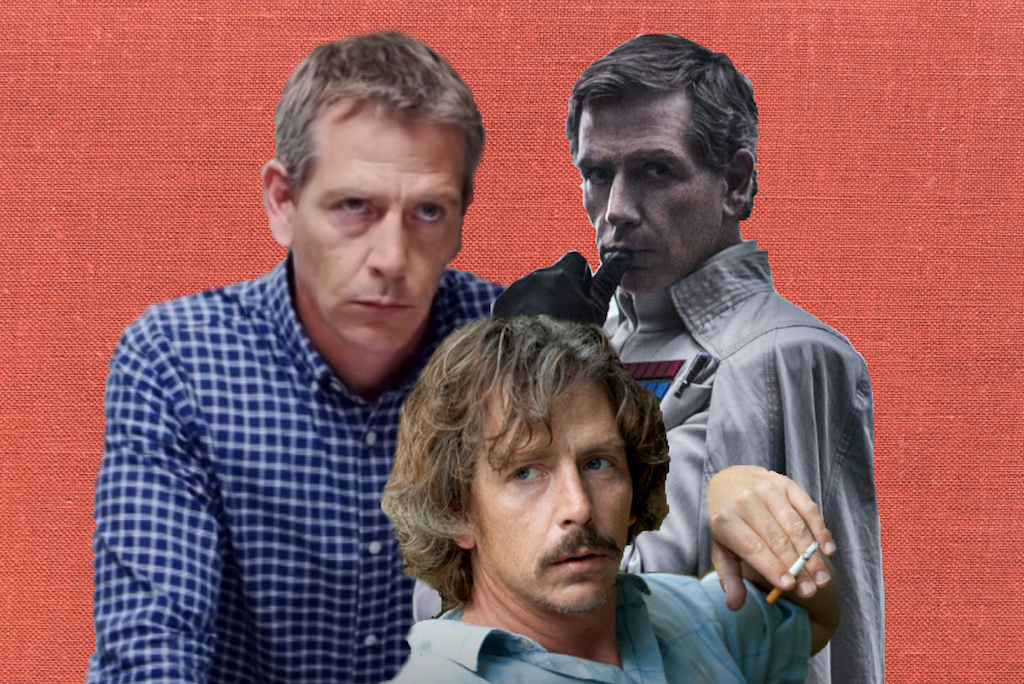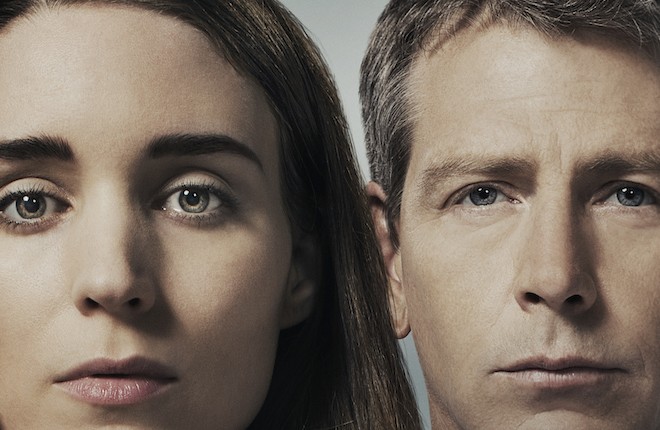Ben Mendelsohn Does Not Care What You Think About Him
He never shies away from "morally ambiguous" characters, but his latest role could get more people talking.

You may recognise Ben Mendelsohn as one of the select few Aussie actors making it super big in the US. Perhaps you’ve seen him as the official “Black Sheep” of myriad films and television series; he plays tricky and often dastardly characters with great dexterity. Or maybe you recognise him as the infamous eater of a meat pie Down Under.
Whatever connection you have to Mendo, there’s no doubt his distinctive voice, his relaxed and pensive interview style, and his impressive ouevre of onscreen roles.
Just asked @BenMendelsohn_ about this iconic paparazzi photo. His explanation: "I was f***ing dyng to eat a meat pie." Fair. pic.twitter.com/bb7KGSV8r2
— Susannah Guthrie (@susguthrie) June 13, 2017
Mendelsohn is back in Australia this month promoting his role (another tricky one) in the upcoming drama Una, starring alongside Rooney Mara. In Una, Mara plays the eponymous young woman who tracks down Ray (Mendelsohn) several years after he groomed and abused her as a child; she infiltrates his new workplace to confront him.
Lately, Mendelsohn has made a name for himself with similarly chewy roles in US film and television. He starred alongside Kyle Chandler (Friday Night Lights) and Linda Cardellini (Freaks and Geeks) in Netflix’s family drama Bloodline, as an ostracised son in a sprawling American family. He had roles in The Dark Night Rises, Slow West, The Place Beyond The Pines and Jessa’s problematic father on Girls. Last year he starred as the villain Orson Krennic in the Star Wars heist story Rogue One. All this, of course, comes after Australian classics like Neighbours, The Secret Life Of Us, Tangle, and Love My Way.
When Mendelsohn comes to the phone with a friendly “G’day!”, I find his gravelly Aussie drawl — blissfully unaffected by years working in another country — a bit arresting. That is, until he jolts me back into the conversation by exclaiming “Bullshit!” loudly into the receiver when I tell him it’s sunny in Melbourne.
It seems that you can’t ever take the Aussie larrikin out of the bloke, no matter how much Hollywood adores them.
Junkee: What attracted you to Una? Why did you choose it?
Ben Mendelsohn: I found it an incredibly thrilling read. And I knew that both Benedict [Andrews], our director, and Rooney [Mara] were attached. So I finished it and that was it. I finished it and I was dying to do it.
Did you read the play as well as the screenplay?
No, no. I was familiar with the play, but only in reverse. Only after reading the screenplay.
How do you feel the story has been changed by being adapted to film?
Well I think you get more of an idea what they were like together. And what I like about it — in terms of the film — is you’re not entirely sure whether it’s fact or recollection by either one of them in the flashbacks. I have my own idea of what it is, but we sort of fleshed that out. The play is a two-hander, so there’s a bit more extension of the world.
The subject matter is obviously quite controversial. How did you prepare to take on this role and this subject matter?
You just spend a bit of time talking about what that might mean, in terms of the way these two people treat each other. But you’re spending a lot more time in that relationship than you normally would. And then obviously there’s the really young actress [who plays Una], so that’s a bit more delicate. I went and met with her family, and spoke a bit about the gravity of the stuff. And that was probably as much for me, for my comfort, as it was for hers or theirs.
With Ray, I feel like in the film you’re almost invited to sympathise with his position a little bit — particularly because this older version of Una is quite extreme in the way that she’s coming back to confront him. What’s your perspective on how the audience should feel about Ray?
It might not surprise you that I would probably avoid being prescriptive about that. Look, it’s part of the job of the material to be confusing and feel grey. I think that’s part of what’s going on in there. And it’s a conversation that’s been a big part of the social concern for the last several decades. So it’s very timely in that regard. But I think [the audience will] come to their own conclusions quite unaided by being told.

Was there an extra challenge to this piece because you were taking on subject matter that’s so controversial.
It’s not really an extra challenge, per se. I think you expect that people will feel a certain way about it — well, you’re sort of aware of how people feel about it. But I think there’s sometimes a misconstruing as to what the characters might be going through, versus what the actor is going through.
I mean, I think he’s pretty embarrassed. I think he’s pretty confronted. But I also think that the reliving of the initial relationship is nowhere near as rosy or as wholesome — I don’t want to say wholesome, I want to say fulsome — and rich as I think it’s being remembered by either of the participants. I imagine that type of a relationship to be incredibly boring and frustrating outside of the calamitous exposure that’s going on. I’d expect it to actually be a very poor endeavour.
You’re becoming quite well-known for taking on these… I read a good description of them as being “morally ambiguous” characters. What do you think attracts you to these characters?
I think they’ve usually got a lot more stuff in them to play. I mean, there’s a lot more stuff that’s going on with these antagonists, or these kinds of characters who create a kind of a havoc or a difficulty in the story. I think they’ve got a lot going on, and that’s a lot of fun to play. It’s not so much me being attracted to them, as it is them being attracted to me.
“When you go and work overseas, you really get celebrated a bit more here. That’s the way it goes.”
You’re an actor who’s been working for a really long time, particularly in television. What’s your perspective on how working as an actor has changed now that television is broadening out a bit?
If you’re participating in the good end of telly, there’s something better all over the board. I mean we just — we’re better at this stuff than we were 20 and 30 years ago. You know, the depth and the skill of the writing has gone up a lot. It’s a really good time to be doing it because there’s so much good stuff out there. There really is so much out there at the moment. So I still think we’ll look back and see this as a Golden Age.
How do you feel about working overseas versus working in Australia. Do you miss the Australian industry?
Yeah, I miss a lot of things about it. There’s a lot of things about working overseas that are really good. And there’s a certain kind of earthiness and camaraderie that I miss in Australia. There’s a certain close-quarterness. But it does seem to a degree like, when you go and work overseas, you really get celebrated a bit more here. So, that’s the way it goes.
And as an actor do you tend to follow what the public and the media says about your performances?
No I don’t read them, and I still don’t watch them. Unless I’m at an event where it’s a stupid thing to do to get up and leave.
Why?
‘Cause it’s not what I do. I mean, I have watched a lot of stuff, but it just sort of gets in the way. It’s a self-conscious enough job as it is. I don’t want to add to it, really. That’s all. I think that often the best and most enjoyable performances that I like to watch have a sort of a freedom to them, and self-consciousness — or too much self-censoring — just seems to be not a good idea. I try and do what I can to get that stuff out of the way.
–
Matilda Dixon-Smith is Junkee’s Staff Writer. She tweets at @mdixonsmith.
–
Love film and TV? We’re holding our inaugural Video Junkee festival in July, a new annual event for lovers and creators of online video. Video Junkee is on July 28 & 29 at Carriageworks in Sydney, featuring keynotes, masterclasses, screenings, interviews and more. Tickets are on sale now.